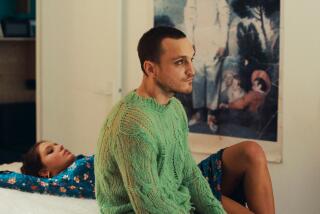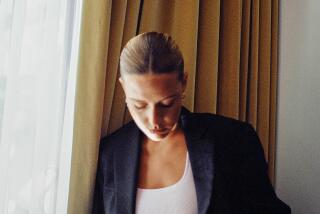Betting on a Pink Streak
- Share via
Just four months after launching its new programming schedule, which promised weeklong bookings (two weeks at most), the Port Theatre in Corona del Mar has broken that promise and scheduled “Ma Vie en Rose” (“My Life in Pink”) for a three-week engagement beginning Friday.
In the Port’s bid to become Orange County’s preeminent art house--its only competition is Edwards South Coast Village 3 in Santa Ana--it has already forgotten the major complaint patrons had about its old programming policy: movies that overstayed their welcome.
Given the many festival prizes that “Ma Vie en Rose” has piled up--including the Prix Soleil d’Enfance at the Cannes Film Festival earlier this year and the best-picture award at the Seattle Gay and Lesbian Film Festival--there’s a chance the Port’s broken promise may turn out to be a wise move.
Perhaps word of mouth will build a huge audience for what Times film critic Kenneth Turan has called “a serious comedy about gender confusion” or what its 34-year-old director, first-time Belgian filmmaker Alain Berliner, calls “an identity problem.” (Berliner profiled, Page 12.)
Moreover, if the movie wins the Golden Globe Award for best foreign film--it has been nominated in that category--the lengthy booking might be seen as prescient. (As Belgium’s entry in the Academy Awards, the movie is also vying for an Oscar nomination for best foreign film.)
“Ma Vie en Rose,” made for a mere $3.5 million, was inspired by the youthful experiences of its screenwriter, Chris Vander Stappen, and revolves around 7-year-old Ludovic, who wants to be a girl. It’s a comedy with serious implications and is told in a buoyant style.
“Too clever to be categorized,” as one critic said, the movie takes place in a comfortable Parisian suburb where Ludovic’s bourgeois family has recently moved and where social conformity, as might be expected, turns out to be the rule no less than it does in suburban Southern California.
In fact, the housing tract (complete with parks and picnic grounds, backyard greenery and two-car garages) looks remarkably like any number of planned Orange County communities rather than the provincial villages of the French countryside.
*
Ludovic’s fantasies--not to mention his appearance in a pink party frock while tottering on his mother’s high heels--don’t exactly fit the norm, even in France, where artistic license and tolerance for eccentricities battle Gallic conservatism.
Though Vander Stappen got the idea for the picture from her childhood wish to be a boy, Berliner believed it was more dramatic to reverse genders.
“For a boy to say, ‘I want to drop my virility,’ it’s a real taboo,” Berliner told Turan, whereas a girl’s wish to be a boy--at least as expressed in the word tomboy--is somehow regarded by society as less troubling.
Turan noted that one reason for the movie’s success “is the perfectly pitched performance” by 11-year-old actor Georges Du Fresne, who plays the quiet, moody Ludovic with remarkable steadiness.
The story tends to meander, unspooling lazily like a big ball of yarn wound so loosely that it feels light as a feather. Yet--and this is Berliner’s great achievement--the touching sadness beneath the surface not only does not weigh the picture down but also gives “Ma Vie en Rose” its credibility.
More to Read
Only good movies
Get the Indie Focus newsletter, Mark Olsen's weekly guide to the world of cinema.
You may occasionally receive promotional content from the Los Angeles Times.









